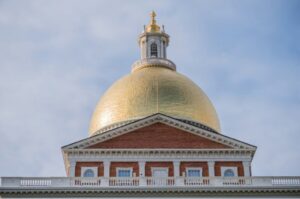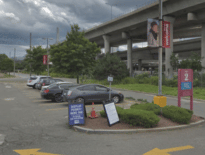The Economic Development Committee on Monday sent forward in the legislative pipeline an updated jobs and downtowns bill (H.4864) that strips out all of the $2.3 billion in federal pandemic relief Baker sought to spend in his version and instead calls only for about $1.2 billion in borrowing.
On the same day, the Bonding Committee on Monday advanced an infrastructure bond bill redraft (H.4867) that, like an earlier version, carries a $9.75 billion bottom line aimed at maximizing the impact of newly available federal dollars. Lawmakers on the panel did not, however, add any provisions explicitly related to a passenger rail extension into western Massachusetts that has emerged as a point of focus between Baker and the state’s congressional delegation.
The dual committee action moves two major bills collectively representing nearly $11 billion in longer-term spending closer to emerging for a vote in the House and the Senate, where lawmakers have only six weeks remaining until the July 31 end of formal business.
Baker in late April filed a $3.5 billion economic development bill (H 4720) that combined $1.2 billion in bond authorizations with the remaining $2.3 billion in unspent American Rescue Plan Act money that the state government still wields. His proposal called for steering project funding to every single municipality in Massachusetts, injecting $750 million into the clean energy industry, putting $300 million toward unemployment overpayments and spending $270 million on housing production.
Democrats who control the Economic Development Committee took a different approach. Instead, they proposed leaving the pot of ARPA funds untouched for a future date and focusing only on borrowing.
Lawmakers could still dip into those federal dollars later in the process or via amendments on the final bill, but the early committee action indicates legislative leaders may not view that as a priority.
The redraft calls for about $268 million in spending on a variety of housing priorities, according to a summary provided by a committee aide. It also seeks to direct $400 million to the MassWorks program, $200 million to the Mass Technology Park Corp for matching grants, and $50 million to help compete for federal broadband funds.
The legislature has until the end of 2024 to obligate the remaining ARPA funds. House and Senate leaders have not laid out a timeline for doing so, and they could opt to wait until Baker’s successor takes office in January to tackle the topic. That idea rankled municipal leaders who met Tuesday for a meeting of the Local Government Advisory Commission.
Local Leaders ‘Extremely’ Disappointed
Easthampton Mayor Nicole LaChapelle said it was “extremely disappointing” to hear that “there’s a pushback from the legislature of not releasing the ARPA funds.” She tied the issue to jobs and said that the sooner the ARPA money is released the sooner local people who are struggling to pay for transportation, child care and food could be working on the projects the Baker administration intended to fund.
“The FORWARD bill needs to be passed and any idea, rumor or truth that there might be hesitancy to keep the ARPA dollars from FORWARD or [a plan to] lengthen the disbursement of those dollars for another administration, I would say puts every municipality at risk, puts jobs [at risk] and affects public health, and even, I would suggest, affect any incoming administration because we have to use those dollars and I know no one in any gubernatorial administration wants to deny the citizens, the residents of Massachusetts, those opportunities,” she said during the LGAC meeting, using the acronym the Baker administration gave its bill.
Newton Mayor Ruthanne Fuller, who serves as the president of the Massachusetts Municipal Association and chairs the LGAC, had a message Tuesday for the lawmakers who control the ARPA purse strings: “Tick tock, tick tock.”
“We’re very aware of trying to obligate funds by 2024. It’s a lot of work to invest funds thoughtfully, so we agree with you completely, lieutenant governor, we hope the legislature will move forward with this,” Fuller said.
The committee did not just snub Baker’s spending goals, either. It also axed the governor’s proposal to sell the Hynes Convention Center for redevelopment, in order to generate affordable housing development funding.
As the Bonding Committee added the newly redrafted downtown revitalization and jobs bill to its to-do pile, it wrapped up its work on the infrastructure bill and sent the latest version to the House Ways and Means Committee, typically the final stop before legislation hits the chamber floor.
Transpo Priorities Get Mixed Results
Baker filed a $9.7 billion version (H.4561) in March, calling for the legislature to enact the bill “as quickly as we possibly can” to ensure the Bay State makes the best use of guaranteed federal dollars in a new infrastructure law and remains in the mix for additional funding opportunities.
Lawmakers on the Bonding Committee made only a handful of changes, one of which calls for a still-unspecified amount of money from a $1.38 billion pot to be spent on electrifying the commuter rail system and water transportation.
The committee also added language creating commissions to study transportation and resiliency along Dorchester’s Morrissey Boulevard and the South Boston waterfront, but did not change the $9.75 billion bottom line from the Transportation Committee’s version, according to a committee aide.
Although Bonding Committee Co-chair Rep. Danielle Gregoire called East-West Rail “the elephant in the room” at a June 1 hearing about the bill, her panel opted against adding any explicit reference to the long-sought project that Baker and Congressman Richard Neal say now hinges on state legislative action to create a new rail authority.
Baker suggested last week that either the infrastructure bond bill or the economic development bond bill – both of which he filed before announcing a “breakthrough” on East-West Rail – could be a viable home for language to stand up the proposed new agency.
The infrastructure bill would steer $2.8 billion toward federal highway projects, $1.35 billion to improvements on state roads, bridges and routes, and $1.38 billion to MBTA modernization.
Another $3.5 billion in the bill would put state money on the table to allow Massachusetts to compete for federal grant reimbursements, with billions of dollars newly available under a new infrastructure law.
It’s likely that representatives and senators will seek to pack the bill with additional earmarks for their districts via amendments, further inflating its bottom line.







